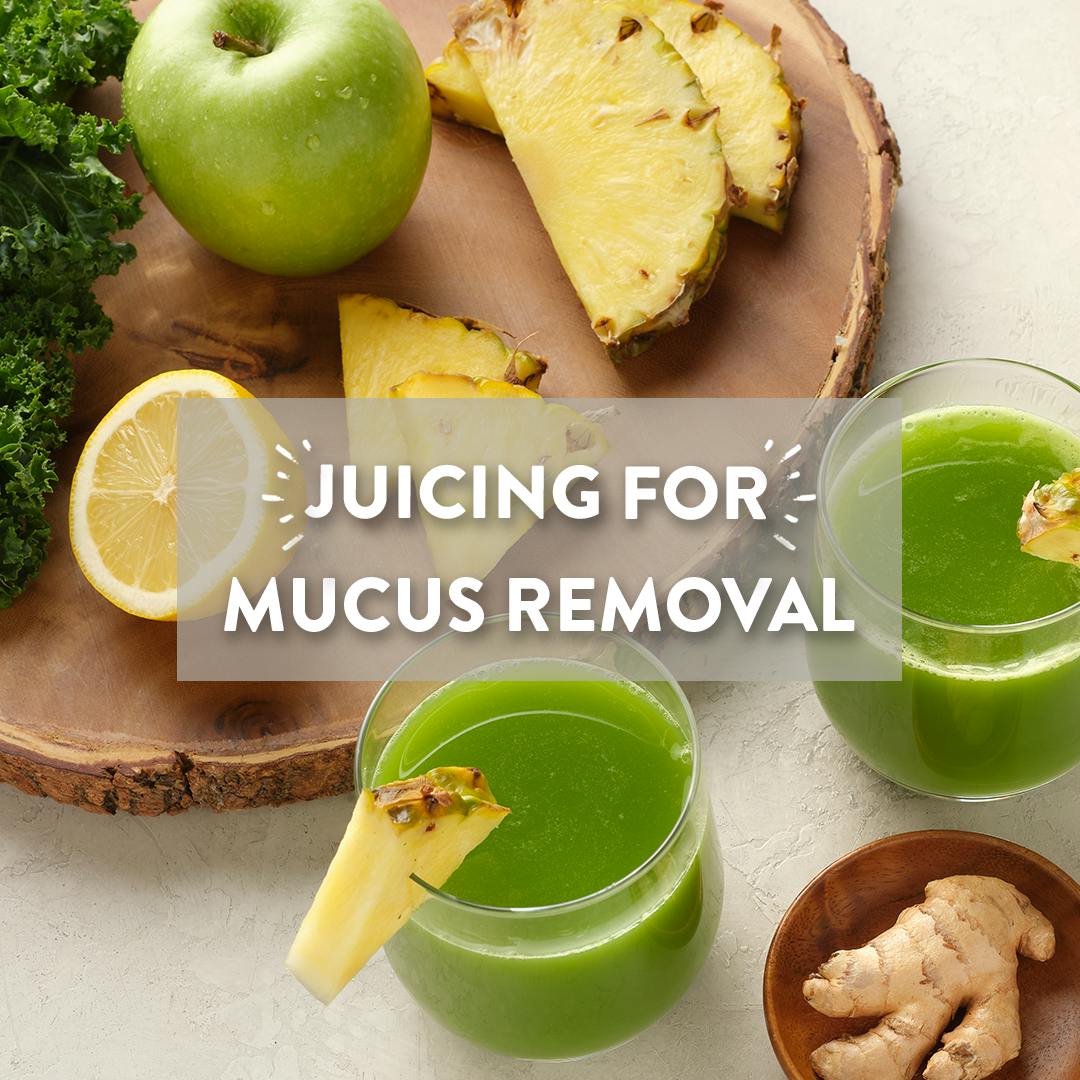The What and Why About Mucus
The work of your mucous membranes is to make phlegm and mucus to protect and support your respiratory system. Phlegm is a thick, viscous substance that forms in the throat and lungs, while mucus is much thinner and secreted from your sinuses and nose.
Why does the body need the mucous membranes to secrete mucus?
Mucous membranes line your mouth, nose, throat, sinuses, and lungs. The secreted mucus traps allergens, dust, and viruses. When you are healthy, the mucus and phlegm is less noticeable because it is thin, but during periods of sickness it becomes thick and gooey to trap the foreign substances more effectively. That is when you can feel it in the back of your throat and your nasal passages.
Fresh Fruits and Vegetables That Can Help Break Down Mucus
Mucus is a healthy part of your respiratory system, but when it becomes excessive and uncomfortable you have options to get rid of it naturally. Freshly squeezed or cold-pressed juices that include any of the following ingredients can make you feel better in no time!
- Pineapple: Pineapples contain a bioflavonoid, bromelain, which is an enzyme that breaks down proteins. It has immune boosting and anti-inflammatory properties, and is thought to help clear congestion in both the upper and lower respiratory systems.
Note: Be sure to include the hard center core of the pineapple when you make the juice because that is where most of the valuable bromelain is to be found. - Guavas: Juice from raw, fresh guavas is rich in important nutrients like antioxidants, vitamin C, and manganese. It is beneficial in curing coughs and colds, and gets rid of the mucus as it disinfects the throat, respiratory tract, and the lungs.
- Citrus: Citrus fruits like oranges, lemons, grapefruits, and limes are rich sources of vitamin C, which is known for its immune-boosting properties. and its ability to thin mucus. Drinking citrus juices can help in relieving congestion and promoting the natural clearing of mucus and making it easier to expel from the body.
- Cucumber, watermelon, and celery: Hydration plays an important role in the body’s mucus management. Water-rich fruits and vegetables like watermelon, cucumber, and celery can assist in keeping you hydrated, thereby reducing mucus production.
- Carrots: This root vegetable is a key provider of vitamin A and beta-carotene. Both these nutrients boost the immune system and are specifically suggested for soothing and healing of the mucous membranes.
- Leafy Greens: Fresh, in-season leafy greens are especially powerful immune boosters as they contain chlorophyll, folate, vitamin A, calcium and vitamin C. They are also high in fiber and assets in reducing mucus levels in the body. Examples of leafy greens include arugula (rocket), bok choy (Chinese chard), Collard greens, dandelion greens, kale, mustard greens, spinach, Swiss chard, and turnip greens.
- Apple cider vinegar: Although ACV may not fit in this list of fresh fruit and veggies for juicing, it might help your excessive mucus problem. Even if you add a teaspoon of unpasteurized, organic apple cider vinegar to your freshly squeezed juice, its antibacterial properties can help with breaking down mucus.
- Ginger: Along with the anti-inflammatory properties of fresh ginger root, it contains enzymes that destroy mucus.
- Turmeric: Turmeric contains curcumin that can help fight off infections that may trigger mucus production. It’s also suggested to aid with decongesting the airways and supporting mucus excretion.
- Cayenne pepper: Capsaicin is a compound in cayenne pepper that helps with excessive coughing and the thinning of mucus.
- Onions and Garlic: Onions and garlic are part of the allium food group, along with scallions, shallots, chives, and leeks. Alliums are known for their anti-inflammatory properties. Onions and garlic can be quite pungent in juices, so it might be a good idea to balance their flavor with other fruits and vegetables in your juice. Citrus fruits like oranges or lemons can help counter the strong onion taste. With an ample supply of the bioflavonoid, quercetin, alliums have a lot to offer when it comes to breaking down mucus and flushing out phlegm.
- Honey: Research indicates that honey has antimicrobial and anti-inflammatory properties. Adding honey to your juice can help by decreasing inflammation and irritation in your throat, thereby reducing mucus secretion.
What about Cherries, Berries, Apples, etc.?
In addition to the fruits and veggies listed here, berries like strawberries, blueberries, and raspberries, cherries, apples, grapes and others are packed with antioxidants and vitamin C that support a strong immune system and overall health, including respiratory health. Although they might not have properties that break down mucus, they play an indirect role in easing the discomfort of excess mucus.
Here’s how:
The liver is the primary detoxifying organ in your body, with its main function that of neutralizing and removing harmful substances from your system, tirelessly.
Mucus, on the other hand, is not a harmful substance, instead it is a substance your body produces to protect and lubricate where necessary. However, when mucus accumulates and becomes too thick, various health issues such as respiratory infections, sinus congestion, and digestive problems can develop.
This is where the antioxidants and vitamins of all those berries, cherries, and other fruits and veggies come into play. By incorporating them into your mucus fighting juices, you can support your liver and keep it functioning properly, indirectly helping eliminate excess mucus and contributing to a healthier body.
In a nutshell
By using these mucus-reducing fruits, vegetables, spices, and herbs in your juicing, you can effectively manage mucus-related symptoms. However, this does not restrict you, and adding other fresh, healthy ingredients can further benefit your overall health and well being.



Rate and Comment